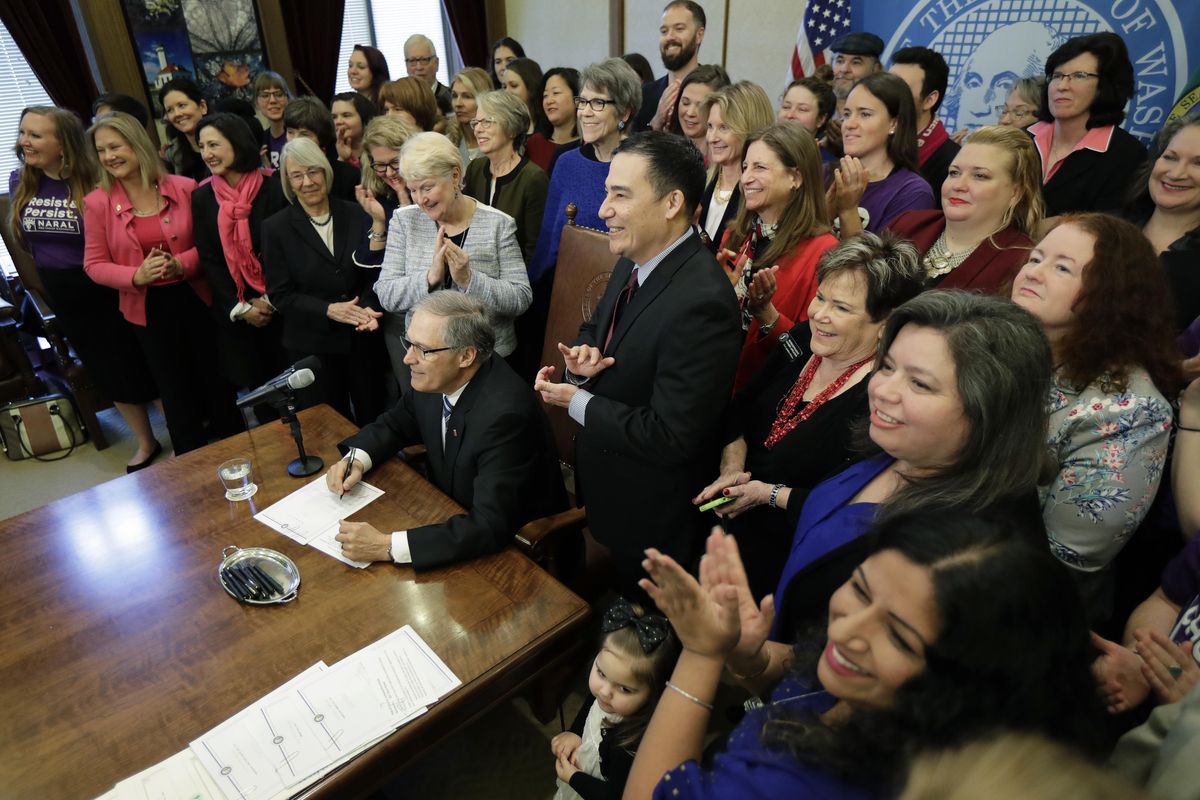Washington takes lead in #MeToo campaign against on-the-job harassment

OLYMPIA – Washington businesses won’t be able to hide complaints of sexual assault or harassment in the workplace.
And nondisclosure agreements or employment contracts will no longer be able to force workers to take their complaints to secret negotiations or bar them from talking publicly about them.
A series of bills signed Wednesday by Gov. Jay Inslee puts Washington in the forefront of the #MeToo movement against sexual harassment and assault in the workplace, as well as strengthening equal pay provisions in state law.
Another bill, known as the Reproductive Parity Act, requires medical insurance policies that cover maternity care to also cover contraception and abortion services.
“These bills continue Washington’s tradition of protecting women’s rights and women’s health,” Inslee said.
In what may be the first law of its kind in the nation, starting on June 7, Washington will prohibit employers from making their new workers sign nondisclosure agreements as a condition of employment. At the same time, agreements currently in place will no longer be able to keep current employees from publicly revealing details of sexual assault or harassment by a supervisor or co-worker.
Employment contracts that require workers to waive their rights to a public process, such as a civil lawsuit, and require private arbitration over allegations of any type of discrimination also will be void.
A task force for the state Human Rights Commission will develop model sexual harassment prevention policies that will be reported to the 2019 Legislature.
Nondisclosure agreements have received more attention recently because of reports that adult film star Stormy Daniels and other women signed them after alleged affairs with Donald Trump before he was president. Sen. Karen Keiser, D-Des Moines, the sponsor of some of the legislation, said such pacts are designed to put workplace sexual assault and harassment “in the closet.”
“This will open that door,” Keiser said, adding the Legislature needed to pass several laws around the issue because of difficult language in current statutes. “This is lawmaking by threading the needle. You have to be precise in your language.”
Before the 2018 session started, the Legislature faced its own allegations of sexual harassment, as 175 women – lawmakers, staff and lobbyists – signed a letter saying they had been the victims of harassing behavior on the job. They called for a safe process to report it and “meaningful consequences” for those who cross the lines.
Rebecca Johnson, a lobbyist whose clients include the Coalition of Sexual Assault Programs and who was instrumental in putting together the letter, said she was happy with the legislative conversation it sparked. She called the package of new laws “hugely empowering.”
The Legislature is bound by the new laws and will use the model policies developed by the task force, Keiser said.
“The #MeToo movement has done so much it’s incredible, to raise consciousness,” Keiser said.
The equal pay law prohibits discrimination of any kind for wages for the same job and bans company policies that forbid workers from discussing their wages with each other. It is the latest in a series of equal pay provisions dating back to 1943 and the days of “Rosie the Riveter,” she said.
“It’s unfortunate we even have to have this debate and this legislation,” Inslee said before signing the bill.
The Reproductive Parity Act has been a legislative goal of Democrats for years, which they were unable to bring up for a vote by a Republican-controlled Senate. But Democrats won a Senate seat in a special election in November that gave them control of both houses.
It requires medical insurance plans that cover childbirth and maternity services to include abortion services and all forms of contraception, guaranteeing access regardless of ability to pay.
A separate bill also requires insurance companies that have mandates to provide mammography services to a patient, to cover three-dimensional mammograms under the same terms as standard two-dimension mammograms.
All new laws take effect June 7.